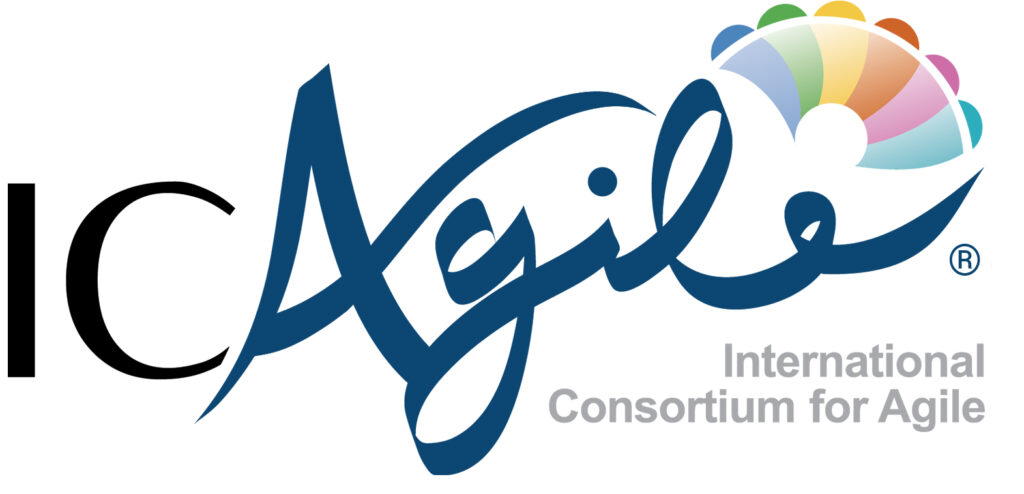ICAgile: Transforming Agile Learning Globally

Introduction to ICAgile and Its Role in Agility
Overview
Founded in 2010, the International Consortium for Agile (ICAgile) was established to provide a comprehensive and diverse approach to Agile education. Co-founded by industry leaders like Ahmed Sidky and Shane Hastie, with its headquarters in Irvine, California, ICAgile focuses on creating learning paths that go beyond certifications, fostering deep understanding and practical application of Agile principles across various disciplines. Unlike other Agile certifying bodies, ICAgile’s focus is on knowledge-building, aiming to help individuals and organizations not just « do Agile » but truly « be Agile. »
Positioning and Influence in Agility
ICAgile is widely regarded as an innovator in Agile education. While some organizations concentrate on specific frameworks like Scrum, ICAgile offers certifications across the entire Agile spectrum, including Lean, Kanban, DevOps, and Agile coaching. The organization positions itself as a framework-agnostic body, allowing organizations to choose the right tools and methods that align with their unique needs. ICAgile has become a key player in shaping Agile education by creating competency-based certifications that emphasize learning and professional growth over exam-based validation.
Evolution of the Organization
Since its launch, ICAgile has continuously evolved to keep pace with the Agile industry’s growth. In response to trends like remote work, business agility, and digital transformation, ICAgile has developed learning paths that address these emerging needs. For example, the recent introduction of certifications focused on Agile HR and Agile Leadership demonstrates ICAgile’s ability to adapt to the changing landscape of modern work environments.
ICAgile’s Mission and Values

Mission and Core Values
ICAgile’s mission is to enable transformational learning that helps individuals and organizations achieve true agility. Rather than promoting a one-size-fits-all certification, ICAgile focuses on offering learning paths that align with each professional’s role and experience level. The organization values continuous learning, collaboration, and customer-centricity, which are reflected in its 27 certification programs that cater to Agile professionals across multiple industries and disciplines.
Engagement with the Agile Community
ICAgile plays an active role in supporting the Agile community. The organization regularly hosts global events, collaborates with thought leaders, and publishes free resources, such as articles and whitepapers, to spread Agile knowledge. ICAgile also partners with training providers worldwide, ensuring that high-quality Agile education is accessible in over 100 countries.
Importance of Certified Trainers and Coaches
Certified ICAgile trainers and coaches are essential to the organization’s educational mission. ICAgile partners with more than 150 training providers to offer a variety of courses across different Agile disciplines. Trainers must be approved by ICAgile to ensure that they meet the organization’s high standards for content delivery and educational impact.
The Impact of ICAgile in the Agile Industry

Key Statistics
Since its inception, ICAgile has certified more than 270,000 professionals across its various learning paths. It has a presence in over 100 countries, with over 50% of its certifications being delivered outside the United States. This makes ICAgile one of the most globally recognized Agile education platforms.
Reputation in the Industry
ICAgile certifications are known for their flexibility and depth. Unlike other certification bodies that rely heavily on exams, ICAgile emphasizes competency-based education, ensuring that learners not only understand Agile practices but also know how to apply them. As a result, ICAgile certifications are widely respected by top global organizations, including Coca-Cola, GE, and Capital One, all of which use ICAgile learning paths to drive Agile transformations.
Key Partners and Collaborations
ICAgile collaborates with leading global organizations, Agile consultants, and training providers to extend its reach and influence. Companies like IBM and Boeing use ICAgile learning paths to build internal Agile capabilities, further reinforcing the organization’s role in corporate Agile adoption.

Case Studies and Success Stories
Case Study: Capital One’s Agile Transformation
One notable example of ICAgile’s impact is Capital One, which partnered with ICAgile to train its internal teams in Agile coaching and product management. Through ICAgile’s learning paths, Capital One improved its Agile maturity, resulting in 20% faster delivery times for key financial products and a more collaborative work culture.
Measurable Impact
In another case, Boeing adopted ICAgile’s Agile Product Management and Agile Leadership programs to strengthen cross-functional collaboration in its software engineering teams. This led to a 30% reduction in project delivery delays and increased stakeholder engagement across departments.
Success Stories from Certified Professionals
Agile practitioners, like Jane Thompson, who obtained the ICAgile Certified Professional in Agile Coaching (ICP-ACC) certification, have reported significant career growth. Jane used her certification to transition into an Agile coaching role at GE, where she helped facilitate Agile transformations across global teams, leading to a 15% improvement in team productivity.
Differentiation from Competitors

Unique Strengths
One of ICAgile’s most distinctive features is its competency-based certification model, which focuses on building real-world skills rather than simply passing an exam. Additionally, ICAgile offers framework-agnostic certifications, meaning its courses are not tied to a single Agile methodology like Scrum or SAFe. This flexibility makes ICAgile highly adaptable for organizations with diverse needs.
Innovative Programs
ICAgile continuously innovates to keep pace with industry demands. For example, its certifications in Agile Marketing, Agile HR, and Business Agility address the growing trend of applying Agile practices beyond software development into departments like marketing, human resources, and finance.
Additional Benefits
ICAgile certifications are designed for lifelong learning, encouraging individuals to continuously improve their knowledge and skills. Additionally, ICAgile offers multi-level learning paths, allowing professionals to progress from beginner to advanced certifications in areas like Agile Coaching and DevOps.
The ICAgile Certification Process

How to Get Certified
To obtain an ICAgile certification, candidates must attend a course delivered by an ICAgile-accredited trainer. For example, the ICAgile Certified Professional (ICP) is the entry-level certification that requires participation in a two- to three-day workshop covering the fundamentals of Agile. Advanced certifications, such as ICP-ACC (Agile Coaching) or ICP-ATF (Agile Team Facilitation), involve more specialized training.
Certification Costs
The cost of ICAgile certifications varies depending on the training provider and location. For instance, the ICP certification course typically costs between $500 and $1,200, depending on the region and the depth of the course. Advanced certifications can range up to $2,500 for more comprehensive programs like ICP-ENT (Enterprise Coaching).
Support and Resources Available
ICAgile provides an array of resources for certification candidates, including study guides, articles, webinars, and access to an ICAgile-certified community. Candidates also benefit from the ICAgile Learning Platform, which offers tools for continued education and professional development.
Future Trends and Innovations

New Certifications and Programs
ICAgile continues to innovate, with recent additions like certifications in Agile Product Management and Agile Leadership. Looking forward, ICAgile is working on new learning paths for AI integration and Business Agility, responding to the rising need for Agile practices in non-technical industries.
Adapting to Market Needs
With the shift toward remote work and distributed teams, ICAgile has begun offering virtual certification programs to accommodate the changing needs of professionals and organizations. Additionally, they are focusing on how Agile practices can be integrated into hybrid work environments, ensuring that their training is future-proof.
Global Expansion
ICAgile is continuously expanding its reach, with plans to further extend its certifications in emerging markets across Asia, Africa, and Latin America. As part of this effort, ICAgile offers courses in multiple languages to ensure that Agile education is accessible to professionals worldwide.